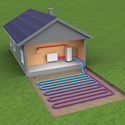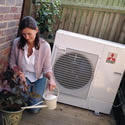Renewable Technologies

There are a number of technologies that go under the term renewables. They can be split into two distinct categories; energy and heat.
Renewable energy is the production of electricity from renewable sources. The most common are wind turbines, solar from photovoltaic panels and hydro schemes. Wind turbines have their limitations in a domestic or urban situation with the most suitable sites being windy hill tops or shoreline facing south west. Of the three ways to generate your own electricity solar photovoltaics (PV) are the most suitable and readily available.


Renewable Heat is the second category and consists of solar hot water, heat pumps and biomass.
Using the sun to warm water has been performed for a long time. Recent developments in solar energy collectors has meant that it is now an economic as well as environmental proposition. Evacuated tube collectors are especially useful in cooler climates such as encountered in the UK. They can provide all the hot water needed in summer and a significant proportion in winter. Further, more detailed information is available elsewhere on this website.

Heat pumps are not truly renewable as energy is used to drive them. What they do is concentrate low grade heat from any part of the environment and supply it to the heated spaces within a dwelling at very efficient rates.
Biomass boilers are now being employed especially in areas where the fuel, usually wood, is readily available. This technology is a ready alternative to gas- or oil-fired installations.
Renewable Technologies in Brief
| Technology | Category | Application |
|---|---|---|
| Wind Turbine | Electricity | Windy sites often remote. Small turbines can be used in urban settings |
| Solar Photovoltaic | Electricity | Any situation that generally faces south |
| Micro Hydro | Electricity | Can be used in small streams up to larger rivers |
| Solar Thermal | Heat (hot water) | On any property with south-facing roof (does need hot water storage) |
| Air Source Heat Pump | Heat | Can be used anywhere - will provide hot water |
| Ground Source Heat Pump | Heat | Needs damp ground - vertical borehole or horizontal array underground |
| Biomass | Heat | Can be used anywhere best near to supply of fuel |
Before considering renewables a property should have the benefit of the following:-
- Cavity wall insulation in walls with cavities.
- At least 270mm of roof insulation where possible.
- A room thermostat and heating time clock.
- Hot water time clock.
- Low energy lighting in suitable light fittings.
- Thermostatic radiator valves in all radiators not in same room as wall thermostat.
